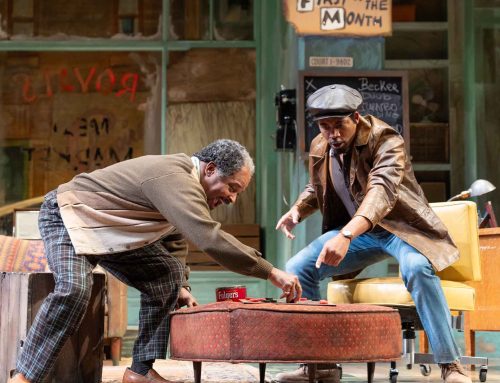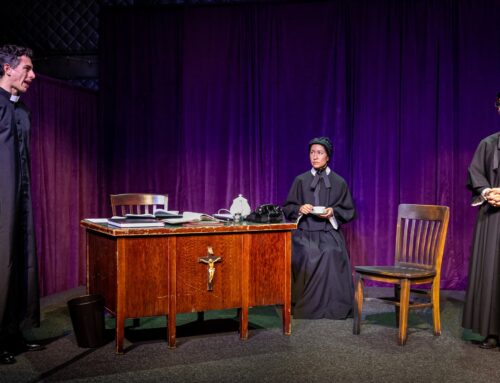
Ashland, Oregon
at the Oregon Shakespeare Festival
Napoli Milionaria! by Eduardo De Filippo, new translation by Linda Alper & Beatrice Basso
Set in Naples during and immediately after World War II, De Filippo’s play chronicles the evolution of a law-abiding, religious family into a group of survivors. No, they’re more than simply survivors. The mother’s black-market sale of rationed foodstuffs and luxuries eventually provides her and her family millions of lire which both stuff the mattress and move the family away from their traditional life and makes them a success story.
But, this black comedy was written to allow only a partial wealth-induced happiness. The story is full of nagging morality and murky details. While the mother, Dona Amalia played by OSF infallible veteran Linda Alper, wheels and deals coffee, flour, and more, her husband, Gennaro (Richard Elmore) worries about getting caught and worries about the rightness and wrongness of the black-market dealings.
The first act has Allied bombs bursting around the family’s apartment. The late-teen children Maria Rosaria (Heather Robinson) and Amedeo (Juan Rivera LeBron) are lookouts watching for the Fascist police whenever Mother brews illegal coffee or sells rationed food. The theme is survival, and the unlawful acts yield only needed war-time calories and not bourgeois riches. Even the local police captain is willing to ignore these transgressions. Overall, Papa’s moralistic warnings sound misplaced, tired, and physically suicidal for a struggling family during all-out war.
Great supporting characters — another OSF hallmark — help us understand how the neighborhood is working and fighting together to get through this terrible time of internal oppression and foreign bombing. It’s not a cheery story, but it moves forward with realism, care, and well-timed comic relief.
The world changed during intermission. The war is over. Papa has been missing for a year, an apparent victim of crossfire during an excursion to get food from the countryside during the darkest hours. But, Amalia has done well. Very well. In a business partnership with her husband’s slick friend Errico (Armando Duran), mother has made millions. The apartment has a chandelier, new wallpaper, fresh curtains, and more. Mother is also on the verge of deciding that her husband is dead and accepting Errico’s chronic offer of more than just a business relationship.
Amalia has also moved beyond pure survival in her business dealings. She has learned how to be a hard-nosed capitalist, capable of evicting a neighborhood family from their home for failure to pay back a loan. Although the debt balance is trivial by Amalia’s new standard of wealth, she doesn’t moderate the scrappiness which served her well during the war.
Meanwhile, Maria Rosaria is a tarty young woman going out with a handsome soldier who promises to marry her and take her home to America. Amedeo and his friends, accustomed to skirting the Fascist rationing regulations have found the transition to outright thievery an easy one to make.
Into these changed circumstances wanders a miraculously saved but battered Papa. He arrives just in time for a planned birthday celebration for Errico hosted by Amalia at Gennaro’s own house. Gennaro’s talk about his year-long struggle to return home is full of descriptions of truly horrible situations. As Gennaro’s old friends gather to celebrate Errico’s birthday, they quickly ignore and shun the grumping, moralistic father. He excuses himself from the festivities and goes to sit with an ill younger daughter in another room.
The play’s final scene has Gennaro confronting the amorality of his family and friends. Amalia and Maria Rosaria are each smacked with the results of their hedonistic, selfish ways. Their resulting relationship with Gennaro is ultimately unclear at the end of the play. Son Amedeo seems to be straying back toward a cleaner, narrower path, but how he and the family will fit together is not resolved, either. Papa is dispensing firm, traditional wisdom and values as head of the clan, but as the curtain falls the characters and the audience are given no certainty. We are all going to have to wait for tomorrow’s morning to see how the war and its distortions have left us.
Death, destruction, moral morass, and ambiguity are the themes of this night of play going. No wonder I liked it so much!
Each actor brought just the right touch to his or her character. Juan Rivera LeBron’s pretty, cocky teenage son was so real you wanted to slap him yourself. The same for Heather Robison’s too suddenly mature Catholic school girl daughter. Outside the immediate family, Tony DeBruno deserves special praise for keeping his police captain sympathetic and avoiding a comic bombast which could easily have swallowed the role. Catherine Coulson and Judith-Marie Bergan added finesse to their supporting parts, too. Even Terri McMahon’s Assunta, written as a laughing hyena, helped the play along with comic relief and didn’t devolved into overacting scenery chewing.
A few jarring notes came from the dated, if just retranslated, script. The society is so patriarchal that the father’s comment that he decided not to kill his daughter for a transgression was a straight line that was meant neither humorously nor received as outrageous by other family members.
Friends didn’t like the play — I don’t know why for sure. I suspect that they weren’t happy with the wandering of the focus and character motivation. At times, it wasn’t clear what a person was going to do or why they did what they did. While that might have annoying, I took the ambiguity as a emotional/mental fog of war. I accepted the motivational opaqueness as a counterpart to the confusion on the battlefield. De Filippo’s way of letting the moral cloudiness mirror the physical chaos struck me powerfully.
Maybe they wanted more resolution, too. The ending wasn’t happy or sad. What would happen next to the characters after the audience went home wasn’t well defined. But, again, I thought this refusal to tie up threads added to the play.
I don’t know why everyone we know wasn’t glowing from the excitement of the play. By my standards, they should have been.
We saw the play late on Sunday, May 29th. It was a prefect way to get us in the frame of mind to observe Memorial Day.
Ozdachs rating: **** out of *****





Leave A Comment